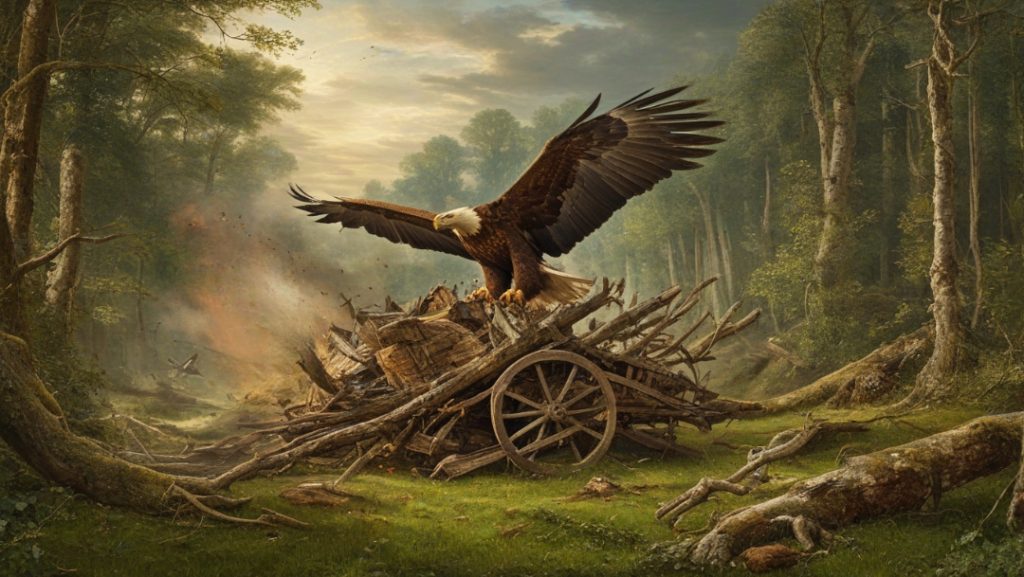After the appearance of the Tree of Relationship to God, now revitalized and blossoming again, the anagogical meaning unfolds and enriches even further.
Beatrice, in the sense of your soul/inner spiritual life, has descended from the carro and is now seated at the root of the tree, surrounded by the seven virtues holding seven lights, and seen as if “she was left there to guard the carro”.
The meanings here are multiple; with the relationship to the Heavens re-established, your soul is now located together with this relationship, and given a responsibility to guard the dual perception and clear view of reality, as expressed through the carro (chariot) metaphor. And to help and support your soul with this protection are the seven virtues and the seven Gifts of the Holy Spirit. This becomes a new image for your inner state; your radiant and beautiful soul peacefully at the root of the new blossoming relationship to the Heavens, and surrounded by virtues and the Holy Spirit – keeping an eye on the understanding and experience of reality, as aligned with the fundamental pattern expressed through the carro.
And with this image established, Beatrice says she will now show the Pilgrim a few things, through a set of visions about the carro and the Tree, and what can happen to both of these if the correct alignments and aims are abandoned. In other words; we have seen the restored soul and restored relationship to God, and now we will learn how they can be damaged or broken.
The first lesson becomes this: false Gods can and will destroy this relationship, and it will destabilize your perception of reality significantly. And Dante uses the Greek Zeus as the example.
The Bird of Jupiter/Zeus suddenly appears from above and faster than lightening tears into the tree, damages the bark, rips off the flowers and leaves, and then smashes into the carro with all its force, making it tumble around like a boat in a storm, violently from one side to the other in the waves. The anagogical imagery is again precise; the bark is the structure of your relationship to the Heaven, and the leaves and flowers are its manifestations (that were withered earlier). The carro is your apprehension of reality now completely destabilized by the force of a deity like Zeus, who represents a form of pre-covenental Divinity, unpredictable and striking at times randomly with his thunderbolts, unaccountable and not according to any spiritual relationship to the souls. (Also called voluntarism in theological terms).
So in some sense, Dante suggests that the first threat to the spiritual relationship established in Eden is the misapprehensions of God’s Nature, that will destroy this relationship and fully destabilize your understanding and experience of Reality.
If the open, generative connection with Divinity as Love and Wisdom is replaced with an unpredictable deity of arbitrary Power and Dominance, the spiritual life is instantly broken, is the implication from Dante. And the Tree is instantly damaged.
Dante’s Eden thus shows us both the right path and its revelations, and also the pre-emptive measures to detect the threats that once again will lead to being expelled from the Garden. The guidance and warnings thus both enrich and solidify the soul’s maturity and growth, and lies a further foundation for the impending new threshold, and ascent into the Heavens.


A great expansion on the anagogical reading of the Tree as the relationship to God. It’s easy to connect the eagle to Rome/empire (like so many scholars do!) but the eagle as representing Zeus and false gods in general opens up that personal level again, something that the reader can act on!
To brainstorm a bit, how interesting it is that the Roman Empire was converted to Christianity, just as Dante “converts” the Ancient Greek and Roman stories by having them be in their proper context, subservient to the true Divinity.
Exactly! It’s quite the different approach, but in terms of the personal level and the kind of misapprehensions inside, this would indeed make sense: mistaking the nature of God does distort “everything” in a way.
And yes brilliant point; Dante “converts” the Greek-Roman tradition, so true! One might wonder if it is/was partly an effort for Dante to “excuse” his earlier assumptions, but then again – it fits. Noble/virtuous aspirations have always been there, pointing in the right direction. And even more so; one might wonder if they are sometimes essential steps today as well – starting with the good values and wisdom (and beauty) in mythology, then gradually discern deeper.